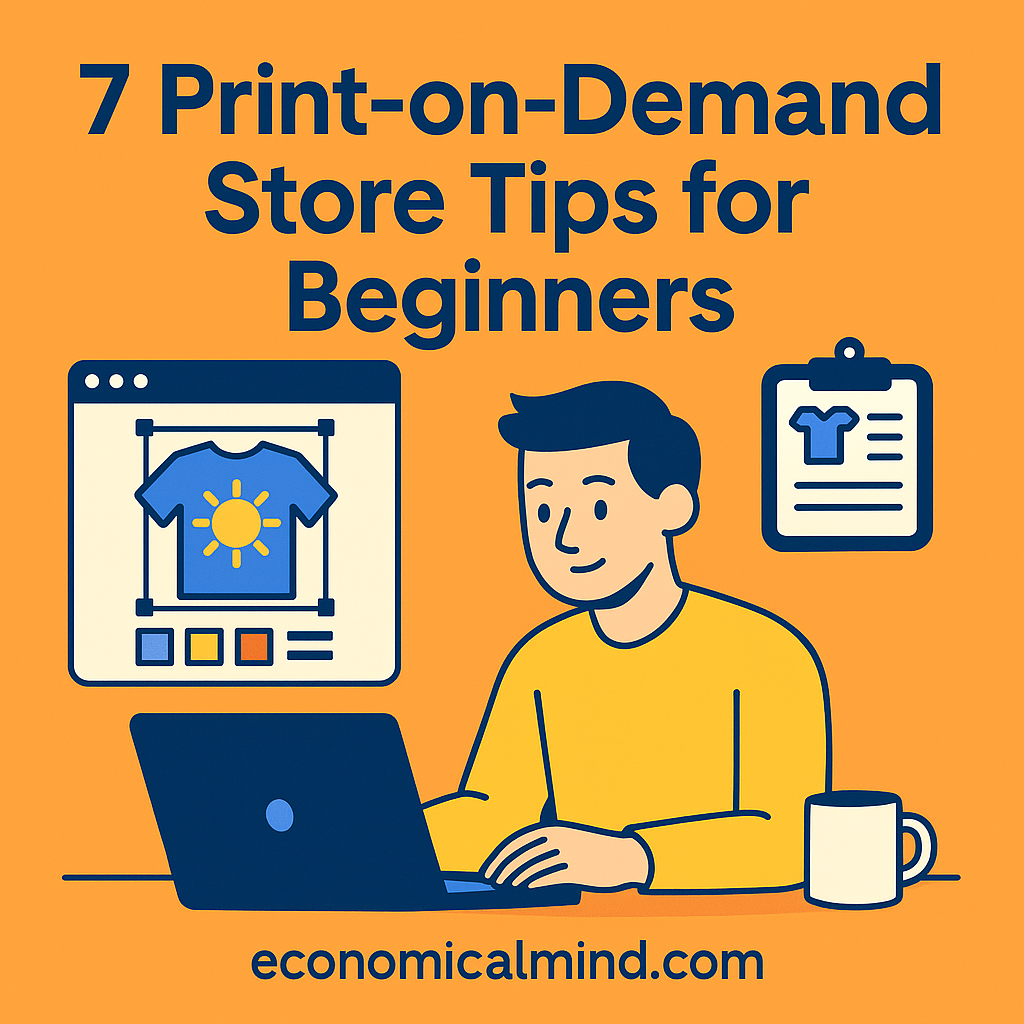
Why Print-on-Demand Is Perfect for Beginners
If you’ve ever wanted to sell T-shirts, mugs, or tote bags without handling inventory, print-on-demand (POD) is your best entry point.
It’s low-risk, beginner-friendly, and can turn creativity into steady passive income.
In a print-on-demand model, you design products online, and a third-party company prints and ships each order automatically. That means no upfront stock, no warehouses, and no shipping headaches.
1. Choose the Right Niche
The fastest way to fail in print-on-demand is by targeting everyone.
Instead, focus on a specific niche — a group of people united by shared interests, values, or humor.
Examples:
- Dog lovers
- Fitness enthusiasts
- Teachers
- Gamers
- Mental health awareness
Niche designs connect emotionally with buyers and make your store stand out in a crowded market.
Pro tip: Browse Etsy, Redbubble, and Amazon for trending ideas within your chosen niche.
2. Pick a Reliable POD Platform
Not all print-on-demand platforms are equal. Choose one that fits your goals, skills, and integration needs.
Top options for 2025 include:
- Printful: High-quality printing, integrates with Shopify, Etsy, and WooCommerce.
- Printify: Large product catalog and competitive prices.
- Gelato: Global production partners for faster shipping.
- Redbubble & TeePublic: Built-in traffic but less brand control.
If you want full ownership, use Shopify + Printful — it’s the gold standard for long-term POD success.
3. Create Eye-Catching, Niche-Specific Designs
Your designs are your brand. You don’t need to be an artist — tools like Canva, Kittl, and Creative Fabrica make it easy.
Focus on:
- Simple, bold typography
- Emotional or funny messages
- Clean graphics that look good on multiple products
Remember: Less is more. The best-selling designs are usually clean and easy to read, even from a small thumbnail.
4. Build a Branded Storefront
Even if you’re starting small, treat your POD shop like a real brand.
To stand out:
- Choose a clean, consistent color palette
- Write strong product descriptions (benefits, not just features)
- Use mockups that show your designs in real-life settings
- Add an “About” page that tells your story
People don’t just buy products — they buy trust and personality.
5. Optimize for SEO
Your products won’t sell if no one can find them.
Use SEO keywords in your titles, tags, and descriptions so search engines and marketplaces understand what you offer.
Example:
Instead of “Funny Shirt,” use “Funny Dog Lover T-Shirt – Gift for Pet Owners.”
Keywords to include:
- “custom shirt”
- “print-on-demand gifts”
- “funny mugs for coffee lovers”
- “personalized tote bags”
Free tools like EverBee, eRank, or Ubersuggest can help find the best-performing keywords for your niche.
6. Use Social Media to Drive Traffic
Don’t rely only on marketplace algorithms — build your own audience.
Platforms that work best for POD:
- Pinterest: Great for evergreen traffic and visual discovery
- TikTok: Perfect for short, fun product demos
- Instagram: Build community around your designs
- YouTube Shorts: Quick “behind-the-design” videos
Post regularly, show real customers using your products, and use hashtags strategically to increase visibility.
7. Automate and Scale
Once your store starts making consistent sales, automate and expand to increase profits.
Steps to scale:
- Outsource design work to freelancers on Fiverr or Upwork
- Add new product categories (hoodies, phone cases, posters)
- Set up email marketing for returning customers
- Use analytics tools to find top sellers and double down on them
The goal is to build a store that earns income even when you’re not actively managing it.
Bonus Tip: Focus on Customer Experience
Even though POD companies handle printing and shipping, you’re still the brand customers remember.
Make sure to:
- Respond to messages quickly
- Double-check product quality and mockups
- Encourage reviews and testimonials
- Offer refunds or replacements when needed
A great reputation builds repeat buyers and long-term passive income.
Final Thoughts
Starting a print-on-demand store is one of the easiest ways to enter the world of online business.
You don’t need inventory, a huge budget, or design experience — just consistency and creativity.
Choose a niche, design products people love, and let automation do the rest. Over time, your POD store can become a steady, scalable source of income.
